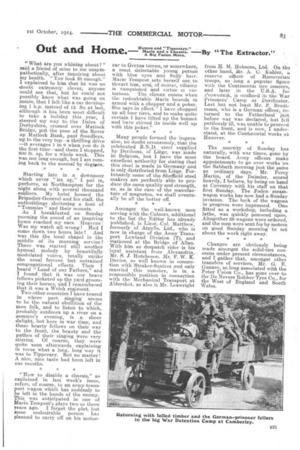Out and Home.
Page 9

If you've noticed an error in this article please click here to report it so we can fix it.
Hymns and "Tipperary." Marie and a Chassis. A Big rotten move. By "The Extractor."
"What are you whining. about ? " said a friend of mine to me unsympathetically, after inquiring about my health. "You look fit enough." I explained to him that he was no doubt extremely clever, anyone could see that, but he could not possibly know what was going on inside, that I felt like a car developing 1 h.p. instead of 12. So at last, although it has been most difficult to take a holiday this year, I steered my way to the Dales of Derbyshire, crossed over Matlock Bridge, put the nose of the Rover up Matlock Bank, past Smedleys, up to the very top—a thrilling drive --it averages 1 in 6 when you do it the first time—and there I stopped, 800 ft. up, for a whole week. This was not long enough, but I am coming back to the normal by degrees.
Starting late in a downpour which never " let up," I put in, perforce, at Northampton for the night along with several thousand
• soldiers. My hotel housed the Brigadier-General and his staff, the outbuildings sheltering a host of " Tommies " and their mounts.
As I breakfasted on Sunday morning the sound of an inspiring hymn reached my ears. Heavens ! Was my watch all wrong ? Had I come down two hours late ? And was this the local chapel in the middle of its morning service ? There was started still another hymnal melody by beautifully modulated voices, totally unlike the usual fervent but untrained congregational effects. Then I heard "Land of our Fathers," and I found that it was our brave fellows picketed up the yard grooming their horses, and I remembered that it was a Welsh regiment.
Two other countries I have toured in where part singing seems to be the natural ebullition of the men folk, and to listen to which, probably outdoors up a river on a i summer's evening, s a sheer delight, but here in war time, and these hearty fellows on their way to the front, the beauty and the
• pathos of their singing were very stirring. Of course, they were quite soon afterwards explaining in verse what a long, long way it 'was to Tipperary. But no matter ! A nice, nice taste had been left in our mouths.
"How to disable a chassis," as explained in last week's issue, refers, of course, to an army-transport wagon which has suddenly to be left in the hands of the enemy. This was anticipated in one of Marie Tempest's plays two or three years ago. I forget the plot, but acme undesirable person has planned to carry off on his motor car to Gretna Green, or somewhere, a most delectable young person with blue eyes and fluffy hair. Marie Tempest sets herself out to thwart him, and, of course, villainy is vanquished and virtue is victorious. The climax comes when the redoubtable Marie bounds in armed with a chopper and a poker. She says in effect "I have chopped up all four tires, and to make quite certain I have lifted up the bonnet and have stirred its inside well up with this poker."
. Many people formed the impression, no doubt erroneously, that the celebrated B.N.D. steel supplied by Derihons, of Liege, was made in Belgium, but I have the most excellent authority for stating that this steel is made in Germany and is only distributed from Liege. Fortunately some of the Sheffield steel makers are perfectly able to produce the same quality and strength, so, as in the case of the manufacture of magnetos, we shall eventually be all the better off.
Amongst the well men
serving with the Colours, additional to the list the Editor has already published, is Lieut.-Col. Matthew, formerly of Argylls, Ltd., who is now in charge of the Army Transport Lowland Division (T), and Stationed at the Bridge of Allan. With him as despatch rider is his loyal assistant from Alexandria, Mr. S. J. Hutcheson. Mr. F. W. K. Davies, so well known in connection with Straker-Squires and only married. this summer, is m a responsible position in eonneetion with the Mechanical Transport at Aldershot, as also is Mr. Leawright from H. M. Hobsons, Ltd. On the other hand, Mr. A. C. Kahler, reserve officer of Hanoverian troops, so long a popular figure with the Contmentai tire concern, and later in the U.S.A. for Prowodnik, is confined in the War Prisoners' Camp at Dorchester. Last but not least Mr. P. Bradtmann, who is a German officer, returned to the Fatherland just before war was declared, but fell perilously ill, was unable to proceed to the front, and is now, I understand, at the Continental works at Hanover.
The sanctity of Sunday has naturally, with war times, gone by the board. Army officers make appointments to go over works on the Sabbath morning just the same as ordinary days. Mr. Percy Martin, of the Daimler, scored heavily, I believe, by being on hand at Coventry with his staff on that first Sunday. The Fodert steamwagon works has now had a Sunday invasion. The bulk of the wagons in progress were impressed. One fitted as a workshop, including a lathe, was quickly pounced upon. Altogether 59 wagons were ordered, and the men were sent for by motors on good Sunday morning to set about the work right away.
Changes are obviously being made amongst the solid-tire concerns under present circumstances, and I gather that, amongst other transfers of services, Mr. G, E. Gunner, so long associated with the Peter Union Co., has gone over to the De Nevers Rubber Tyre Co., for the West of England and South Wales.




















